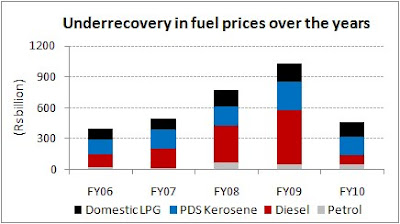Why Petrol Price Deregulation is Good
The decision to deregulate the price of petrol went mostly uncommented on. “Deregulation” means that the Government of India (GOI) will not set petrol prices anymore; instead companies will. In other words, petrol prices at the pump will be decided by global crude prices.
Before deregulation, GOI set fuel prices to be lower than global prices. Take a look at the chart below. It shows the cost of fuel price subsidies to companies:

By deregulating petrol prices, at least losses on the petrol front get eliminated. (By the way, this explains why Shell’s pumps charge a higher rate: they have been charging unsubsidized rates. And why GOI owned oil companies like HPCL and BPCL are often loss making).
But what’s the problem with continuing the subsidies? Well, someone has to pay for the subsidies eventually. So who pays? People like us. Parts of our taxes are used to bear the subsidy cost. Also, these subsidies show up as GOI debt. High GOI debt translates to lower credit rating of GOI. Which in turn leads to higher interest rates when GOI borrows money. Where does GOI get the money to pay that higher interest? Again, from the taxes you & I pay.
Well ok, you say, but won’t our taxes get used for something or the other in any case? So what if it is used to pay for the subsidies? The thing is that the tax money is a zero-sum game. If it is used to pay for the subsidies and higher interest costs, it can’t be used to build wider roads, a better transportation service, provide water and electricity supply.
Which would you rather have: a feel good lower price of petrol for which you pay later in other ways or better infrastructure?
Comments
Post a Comment